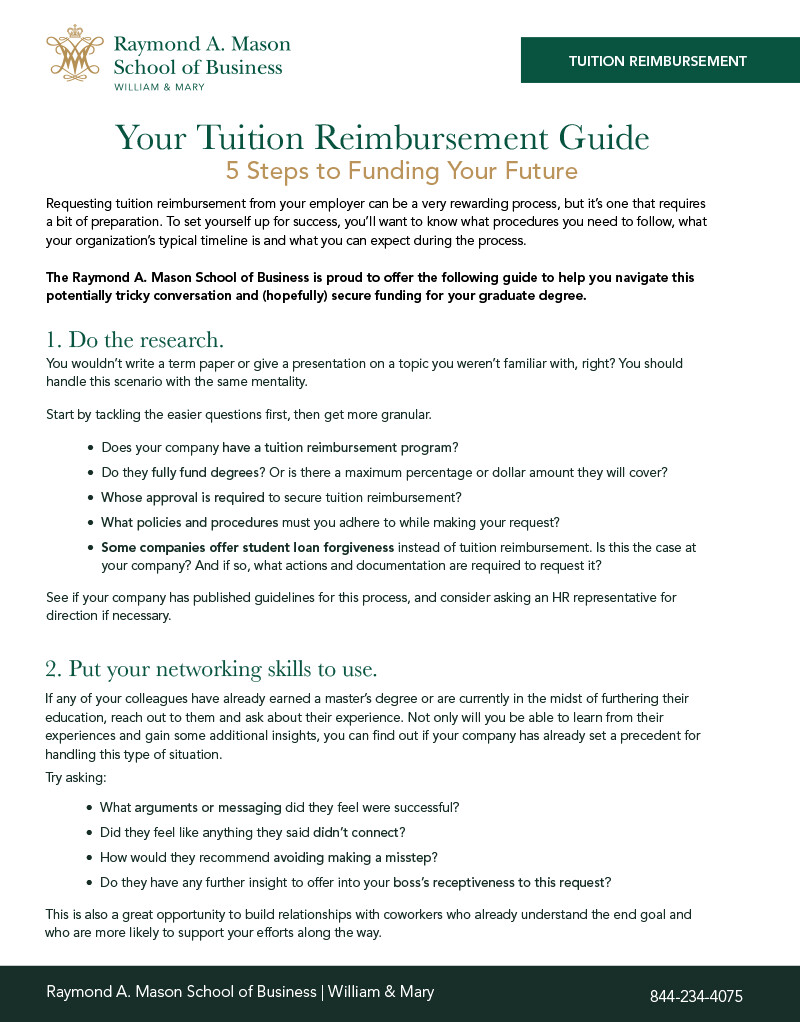When you’re deciding whether to continue your education, cost is usually one of the biggest factors to consider. The good news is that many employers—maybe even yours—could be open to the possibility of tuition reimbursement, or paying for a portion of your online business program’s tuition. Keep in mind that your employer holds a vested interest in your professional development and the value that you bring as an employee. This means they may support your efforts to both increase your performance and start advancing as a leader within the company.
Now, before you start knocking on your boss’s door asking for money, take some time to build a strong case and practice your approach to the conversation. This kind of discussion can be a little uncomfortable or confusing, which is where we come in. We’ve put together the tips below to help guide your conversation and bring you that much closer to an online business degree.
Do the research.
You wouldn’t write a term paper or give a presentation on a topic you weren’t familiar with, right? You should handle this scenario with the same mentality. Start by tackling the easier questions first. For instance, does your company have a tuition reimbursement program? If so, make sure you review the procedures and requirements outlined by your company’s policy. If not, you’ll need to do a little extra digging—in the form of networking.
Put your networking skills to use.
Reach out to some of your colleagues who have already earned a master’s degree while working at your company. Not only will you be able to learn from their experiences and gain some additional insights, you can find out if your company has already set a precedent for handling this type of situation. This is also a great opportunity to build relationships with coworkers who already understand the end goal and who are more likely to support your efforts along the way.
Perfect your plan.
Your plan should provide the specifics of your proposal, which means identifying the school, tuition costs and fees, time to completion and any other details about your program. You can also use this time to emphasize the flexibility of an online program, allowing you to earn an MBA, MSBA, or MSM while still meeting your professional obligations.
Sell it like you mean it.
In order to seal the deal, you’ll have to convince your employer that this is a worthy investment from their perspective. One of the biggest selling points from this angle is the real-time applicability of learned skills within your existing role. This means there’s virtually no gap between learning and doing, which encourages students to utilize their newly developed skills and insights to tackle workplace issues.
Keep the bottom line in mind.
So, how does this affect the bottom line? A 2016 study found that approximately 60 percent of employers offer some type of tuition assistance, but only 2 to 5 percent of them actually evaluate the returns on investment (ROI) for educational benefits.1 A health insurance company by the name of Cigna served as the focus of the same study, which analyzed the company’s Education Reimbursement Program (ERP). According to the analysis, every dollar invested into the ERP is returned to the company, with an additional $1.29 in savings—or, in other words, a 129 percent ROI.1 This study helps to support the argument that investing in your employees’ education should be seen as a worthwhile opportunity that can have a significant (and positive) impact on the company’s bottom line.1
1 Weathers, Lucia. April 2016. Investing in Employee Tuition Benefits Yields Significant Financial Payback for Major Corporation, Study Finds. Retrieved on April 25, 2017, from luminafoundation.org/news-and-views/2016-04-22-cigna-education-reimbursement-program

